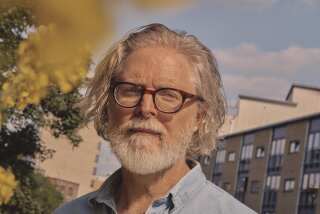Bad and Special Brothers : NO CEILING BUT HEAVEN <i> by Mykal Banta (St. Martin’s Press: $13.95; 192 pp.) </i>
Take one part story of a present-day, working-class family struggling to survive in the suburbs. Mix in the agony of twin sons--one mildly retarded--the other the perpetual outcast of society. Add a dash of a mother unable to cope with reality and the precariousness of life while trying to find God. Season with a factory-working father dying of cancer whose middle-aged “on the make” sister attempts to hold what’s left of her brothers family together. Carefully stir and simmer subplots and some excellently textured prose and what do you have--an enchanting first novel by Mykal Banta titled “No Ceiling but Heaven.”
As in most first works, there are inconsistencies and awkwardnesses. The twin boys’ father, Willy Harden, is never allowed to bloom or open up for the reader so that a substance or base can be built. Through the whole book, Willy’s job at the auto plant is never delineated or probed, which would have aided our perception and empathy due him as a character and as a tragic figure.
It is difficult to make the observer believe that Willy Harden, a factory worker all his life, envisions his funeral as a Viking warrior a la Gary Cooper in the movie “Beau Geste.” There is no basis for our assuming that Willy Harden is a romantic. And yet, due to the deft handling of this scene by Banta, the episode works. Although a Viking funeral appears contrived and somewhat gimmicky, by this time in the story Banta has so engrossed us with artful prose, we want Willy Harden’s final wish to succeed.
There are outstanding moments of writing here. The descriptions of Mrs. Harden rubbing her rosary beads and whispering in her dark bedroom is chilling and insightful. She finds evil in Bobby while rejecting and denying there is anything wrong with her other twin, Johnny. Her mania and breakdown is brought to a climax when she smashes all the windows in her home because she says “. . . God had been trying to come into her home and He couldn’t open the windows.”
Banta describes characters and events in an expressionist mode of stark settings and colloquial language not unlike the visual settings of the painter Edvard Munch. Banta portrays Bobby as if “ . . . black holes where his eyes were, mouth like a black pit, like he was screaming with no sound . . . “ emulating the haunting and eeriness of Munch’s “The Scream.”
But above all, this is Johnny’s story. A story of a retarded boy growing up in a room with his twin brother who does “bad things.” It is a story of a boy painfully aware of his difference that gives this book its special savor and uniqueness.
Johnny realizes the problems with Bobby. He alone understands that Bobby will always be alone because he has never possessed feelings of fear or love.
We see Bobby through Johnny’s eyes, the brother who garroted and beheaded a neighbor’s dog and who almost beats to death a man and his wife for making fun of his twin brother’s backwardness.
Our eyes open just a little wider when we appreciate that Johnny knows why he was sent to the special education center. He knows why he was sent there even though no one really ever told him. In Johnny’s anguish, we understand what it’s like to be “ . . . afraid of a word.” A word where he wanted so much for someone to tell him “ . . . where retarded starts and where it stops.”
John Harden’s world is a realm of innocence combined with an unusual perspective and intuition. He knows when Bobby will do “bad things” just as he knows that he is different and will never laugh and talk and wear nice clothes like the people do on the television. It frustrates Johnny that others only employ him with menial jobs where “ . . . he is getting very tired of cleaning stuff.” We delight at Johnny’s observation after his Aunt Maggie explains to him that Chinese food always tastes better with chopsticks, when Johnny tells her he thought the food was “OK” just with forks.
“No Ceiling but Heaven” is an interesting and worthwhile first novel of a special American family. Banta makes the specialness of Johnny’s world come alive.
More to Read
Sign up for our Book Club newsletter
Get the latest news, events and more from the Los Angeles Times Book Club, and help us get L.A. reading and talking.
You may occasionally receive promotional content from the Los Angeles Times.






